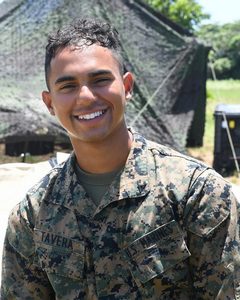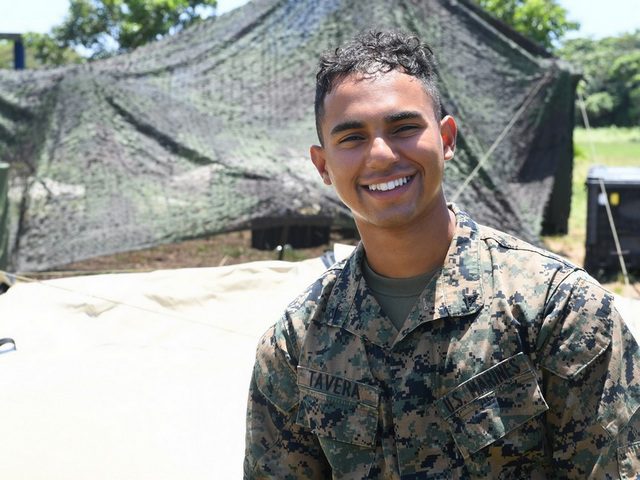
In the midday heat, surrounded by a tropical landscape, he takes off his sunglasses, wiping away the sweat from the brow of his head of black hair.
The 21-year-old Dominican Republic native sits on what appears to be, an enormous tan water balloon. This young U.S. Marine is drenched with sweat, his camouflage blouse is off and his shirt is soaked from a hard day’s work in the Caribbean sun. Despite the sweltering conditions, he still maintains a cheerful and disarming smile. In this hot and humid climate, one might think that this is just another day in this Marine’s life.
Lance Corporal Rafael Tavera built his deployment home in a tent camp at Base Naval de Puerto Castilla, a Honduran naval base, located in Puerto Castilla, Honduras. He traveled over 3,000 miles from his home in Miami to arrive in the Colon Department fishing village set on the western edge of the Caribbean Sea.
With nearly three years of service in the Marine Corps, this basic water support technician, attached to the 8th Engineer Support Battalion at Camp Lejeune, NC, found himself on his first overseas mission: Southern Partnership Station 2017.
“I like being here in Honduras, because it is a new experience for me,” Tavera said. “I am here to work and learn from the people of Honduras. That is my mission for every place I travel to.”
The large water balloon-like object that Tavera sat on is actually a water storage unit. He oversees and maintains four 1,000 gallon and three 3,000 gallon water storage units, totaling 13,000 gallons. These storage units are part of a lightweight water purification system that the Marine Corps uses to provide clean water services for deployed military members. The system can purify fresh and salt water, from rivers and oceans, for use in showers, laundry services and even drinking and cooking. Tavera’s daily mission is to provide his fellow troops with access to vital clean water.
To help keep the nearly 100 marines, sailors, soldiers and airmen of the Southern Partnership Station 2017 mission healthy, Tavera tests, analyzes and purifies the camp water supply daily. With his help, camp residents are able to take showers after working long hours in the unforgiving climate, while fully dressed in uniforms and protective safety equipment. This service keeps the camp running smoothly, ensures proper hygiene and keeps the troops’ morale high. This, in turn, helps his teammates to effectively assist and train with the military, government and citizens of Honduras.
The Puerto Castilla tent camp boasts 12 shower units that operate around the clock, thanks to Tavera and his team. He and his fellow Marines work hard every day to make sure the water stays ready for use.
Water treatment is not the only service that Tavera provides for the mission. As an accomplished Spanish-speaker, he translates for the U.S. troops and local Honduran workers who supply resources and services to the camp. He also visits local hospitals in Colon and translates for the U.S. Navy medical professionals during their training and knowledge exchanges with Honduran doctors and nurses.
“Being able to speak Spanish, I know I am doing a good thing for the people of Honduras, by translating the words of the Navy doctors for those that are in the hospital,” Tavera said. “It makes me feel like I am helping these people learn the medical training they need to help the people in this country, and to me, that is important.”
Tavera will continue to proudly support the Southern Partnership Station 2017 mission in Central and South America until it concludes in late October.
For more information, visit https://www.dvidshub.net/feature/SPSEPF17 or https://www.facebook.com/southernpartnershipstation.






